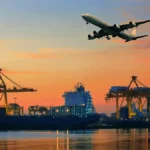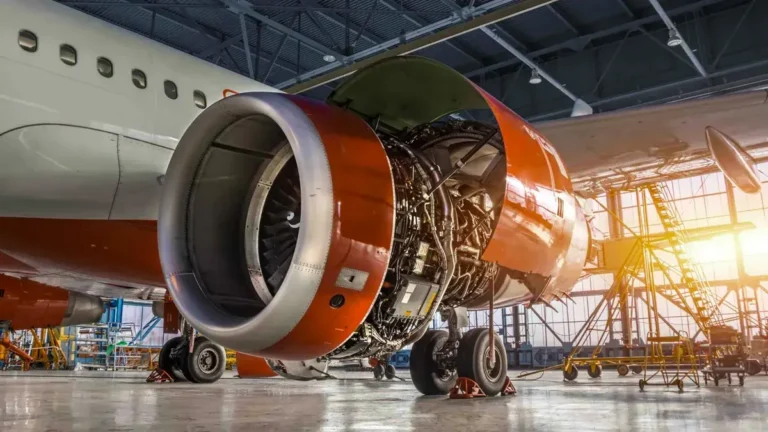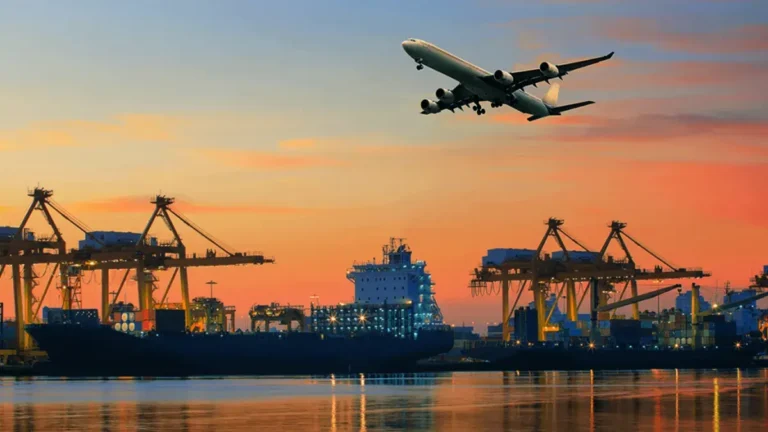Shipping goods from Asia to Europe is one of the world’s busiest freight lanes. Every day, thousands of tons of cargo travel between major hubs in China, Southeast Asia, and Europe — moving everything from electronics and fashion to industrial machinery.
Whether you’re a new exporter or an experienced buyer looking to optimize your supply chain, this guide explains how the process works, how long it takes, what it costs, and how to avoid common delays. It’s built on facts, not fluff — and designed to help you ship smarter.
What Are Your Shipping Options?

There are three main ways to ship from Asia to Europe. Each option has trade-offs in terms of speed, cost, and cargo suitability.
1. Air Freight
- Best for: Time-sensitive goods, lightweight cargo
- Transit time: 3–7 days
- Cost: High
Air freight is ideal when speed matters most. E-commerce shipments, electronics, urgent samples, or perishable items are common air cargo types.
2. Sea Freight
- Best for: Bulk cargo, containers, heavy pallets
- Transit time: 25–40 days
- Cost: Low
Sea freight is the most cost-effective way to move large volumes. You can book: - FCL (Full Container Load) – Reserved for one shipper
- LCL (Less-than-Container Load) – Shared container space
3. Multimodal Freight
- Best for: Flexibility in cost/speed balance
- Transit time: Varies
Multimodal shipping combines sea, air, and road. For example, you can ship by sea to Dubai, then by air to Western Europe. This can reduce costs while still speeding up part of the journey.
Explore your freight options with Roadmap Logistics
Documents You’ll Need

Accurate documentation is critical. Mistakes cause delays and customs holds.
Here’s what you typically need:
| Document | Purpose |
|---|---|
| Commercial Invoice | Declares value and details of goods |
| Packing List | Lists item count, weight, and volume |
| Certificate of Origin | States where the goods were made |
| Bill of Lading (Sea) | Proof of shipment and transport contract |
| Airway Bill (Air) | Shipping document for air freight |
| HS Codes | Identifies goods for customs duties and tariffs |
⚠️ Tip: Always double-check HS Codes and item descriptions. You can use World Customs Organization’s HS Database to ensure accuracy.
Need help with compliance? Our customs team can handle it for you
Major Routes and Transit Hubs

Asia-to-Europe shipping is supported by vast logistics infrastructure. Here’s an overview of common origin and destination points:
Top Departure Ports/Airports in Asia:
- China: Shanghai, Shenzhen, Ningbo, Guangzhou, Hong Kong
- Vietnam: Hai Phong, Ho Chi Minh
- Thailand: Laem Chabang (sea), Suvarnabhumi (air)
- Singapore: Key air and sea hub for regional consolidation
Common European Destinations:
- Sea Ports: Rotterdam (Netherlands), Hamburg (Germany), Antwerp (Belgium), Marseille (France)
- Air Hubs: Frankfurt, Amsterdam Schiphol, Paris CDG, Heathrow
Example: Shipping from Shenzhen to Rotterdam by sea takes about 30–40 days. From Bangkok to Frankfurt by air takes 4–6 days.
Multimodal routes also include rail through the China–Europe Railway Express, connecting inland Chinese cities to Poland, Germany, and beyond.
Source: European Commission – Transport
Cost Breakdown & Charges to Expect

Here’s what goes into your freight cost:
| Category | Notes |
|---|---|
| Freight Charges | Based on weight/volume and mode (air/sea/multimodal) |
| Customs Duties & VAT | Varies by destination, product category, and HS Code |
| Port Charges | Terminal handling, storage, container fees |
| Inland Delivery | Trucking from port to warehouse or customer |
| Insurance (Optional) | Recommended for high-value goods |
Example:
Shipping a 1 CBM (Cubic Meter) box of electronics from China to the Netherlands:
- Air Freight: $1,200–1,800 (delivery in 5 days)
- Sea Freight (LCL): $300–500 (delivery in 35–40 days)
- VAT: 21% (NL rate)
- Duties: Vary by HS Code
Want exact costs? Get a custom quote from Roadmap
How Long Does It Take to Ship from Asia to Europe?

| Mode | Transit Time (Avg.) |
|---|---|
| Air Freight | 3–7 days |
| Sea Freight (FCL) | 25–35 days |
| Sea Freight (LCL) | 30–40 days |
| Multimodal | 10–25 days (route dependent) |
Note: Peak season, port congestion, and customs delays can extend these estimates.
How to Avoid Shipping Delays

Shipping delays can cost your business time and money. Here’s how to avoid them:
✅ Use Correct HS Codes
Incorrect codes can result in higher taxes or goods being held by customs.
✅ Prepare Documents in Advance
Submit all shipping documents before cargo departs to prevent clearance delays.
✅ Avoid Peak Season Shipping
Late Q3 to early Q4 (before holiday shopping) is typically high traffic for both sea and air.
✅ Choose a Trusted Partner
Working with an experienced freight forwarder reduces errors and delays.
Roadmap Logistics offers pre-clearance support, proactive communication, and fast customs turnaround.
How to Ship from China to Europe

Shipping from China is similar to other Asian countries, but volume is higher, so planning matters more.
Key steps:
- Select supplier/exporter
- Book freight (FCL, LCL, or air)
- Confirm documentation (China often requires export permits)
- Choose destination port and confirm delivery terms (Incoterms)
- Ensure goods are cleared at destination customs
Major export ports in China include:
- Shenzhen
- Ningbo
- Shanghai
Airports include:
- Hong Kong
- Guangzhou Baiyun
- Shanghai Pudong
We recommend booking at least 10–14 days ahead for sea freight and 3–5 days for air freight during normal seasons.
How Much Is Freight from China to Europe?

Freight rates vary week to week, but here’s a general guide:
| Cargo Type | Air Freight | Sea Freight (LCL) |
|---|---|---|
| 100 kg, 0.8 CBM | $900–1,300 (5 days) | $200–350 (35 days) |
| 1,000 kg, 5 CBM | $6,000+ (not advised) | $600–900 (FCL better) |
These costs exclude customs, VAT, and delivery. Sea freight becomes more cost-effective at 1 CBM or above.
For updated rates, contact us via our freight quote form
What’s the Best Way to Ship Products from China?

There’s no single “best way” — it depends on your:
- Budget
- Timeline
- Cargo volume and type
Use this simple guide:
| Situation | Best Option |
|---|---|
| Urgent samples or launch inventory | Air Freight |
| Heavy or bulky goods | Sea (FCL or LCL) |
| Balancing speed and cost | Multimodal |
| Infrequent or small shipments | LCL |
| High-volume, stable inventory flow | FCL |
Still unsure? Speak with a freight expert
Why Work With Roadmap Logistics?

Shipping internationally isn’t just about transport — it’s about coordination, paperwork, and reliability.
Here’s why Roadmap Logistics is a strong choice for Asia–Europe trade:
- We’re based in Asia, with local knowledge of ports, customs, and suppliers.
- We speak your language — we explain everything clearly and simply.
- We respond fast — no more waiting days for basic answers.
- No hidden charges — our quotes are transparent and tailored to your cargo.
From the moment your cargo leaves the factory until it clears customs in Europe, we handle it all.
See how we simplify global shipping on our About Page
FAQ: Shipping from Asia to Europe
How long does shipping to Europe take?
- Air: 3–7 business days
- Sea: 25–40 days depending on the route and customs processing
Can I ship partial containers?
Yes — LCL (Less-than-Container Load) lets you share space with others.
What if I’ve never exported before?
We guide you through the entire process. Start with a contact form.
Do I need a customs broker?
Not if you’re working with us — we handle clearance and documentation for you.
How do I know my cargo is safe?
We recommend insurance and provide secure loading, packaging, and tracking services.
Conclusion
Shipping from Asia to Europe doesn’t have to be complicated. With the right preparation and a reliable logistics partner, you can save money, avoid delays, and keep your supply chain running smoothly.
Whether you’re shipping from China, Thailand, or Vietnam — we’ve got the process, people, and network to support your success.
Explore more logistics insights on our blog








